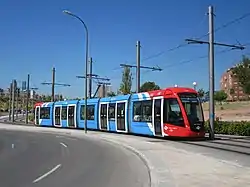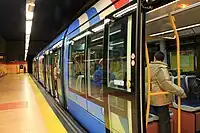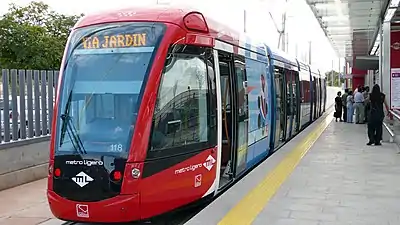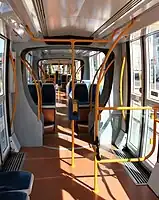Metro Ligero
The Metro Ligero (Spanish pronunciation: [ˈmetɾo liˈxeɾo]; literally "Light Metro", meaning "Light Rail") is a semi-metro system in Madrid, Spain. It has three lines,[1] totaling 27.8 kilometres (17.3 mi), and 37 stations.
| Metro Ligero | |
|---|---|
 | |
 An LRV on Line ML-1 in 2011. | |
| Overview | |
| Owner | Autonomous Government of the Community of Madrid |
| Locale | Madrid |
| Transit type | Light rail/Semi-metro |
| Number of lines | 3[1] |
| Number of stations | 37 |
| Website | www |
| Operation | |
| Began operation | 24 May 2007 |
| Technical | |
| System length | 28 km (17 mi) |
| Track gauge | 1,435 mm (4 ft 8+1⁄2 in) standard gauge |
| Electrification | 750 V DC |
Lines
Line ML-1
Line ML-1 | ||||||||||||||||||||||||||||||||||||||||||||||||||||||||||||||||||||||
|---|---|---|---|---|---|---|---|---|---|---|---|---|---|---|---|---|---|---|---|---|---|---|---|---|---|---|---|---|---|---|---|---|---|---|---|---|---|---|---|---|---|---|---|---|---|---|---|---|---|---|---|---|---|---|---|---|---|---|---|---|---|---|---|---|---|---|---|---|---|---|
| ||||||||||||||||||||||||||||||||||||||||||||||||||||||||||||||||||||||
![]() Line ML-1 opened between Pinar de Chamartín and Las Tablas on 24 May 2007, with 5.4 kilometres (3.4 mi) and nine stations, five of which are underground. Both termini offer connections to lines of the Madrid Metro. The only above-ground stations are Antonio Saura, Álvarez de Villaamil, Palas de Rey, and Las Tablas. Line ML-1 serves the new neighbourhoods of Sanchinarro and Las Tablas, in the Fuencarral district.
Line ML-1 opened between Pinar de Chamartín and Las Tablas on 24 May 2007, with 5.4 kilometres (3.4 mi) and nine stations, five of which are underground. Both termini offer connections to lines of the Madrid Metro. The only above-ground stations are Antonio Saura, Álvarez de Villaamil, Palas de Rey, and Las Tablas. Line ML-1 serves the new neighbourhoods of Sanchinarro and Las Tablas, in the Fuencarral district.

Line ML-2
Line ML-2 |
|---|
![]() Line ML-2 opened on 27 July 2007, between Colonia Jardín and Estación de Aravaca in the neighbourhood of Aravaca, in the western communities of Boadilla del Monte and Pozuelo de Alarcón. It is 8.7 kilometres (5.4 mi) long and has 13 stations, three of which are underground. They are Colonia Jardín, Somosaguas Sur, and Avenida de Europa. Line ML-2 also serves the Complutense University of Madrid. As part of the project, provision has been made for a future station at Prado de las Bodegas, which is subject to further development. The station will also provide a connection to the planned Metro Ligero Line ML-4, to Estación de Las Rozas.
Line ML-2 opened on 27 July 2007, between Colonia Jardín and Estación de Aravaca in the neighbourhood of Aravaca, in the western communities of Boadilla del Monte and Pozuelo de Alarcón. It is 8.7 kilometres (5.4 mi) long and has 13 stations, three of which are underground. They are Colonia Jardín, Somosaguas Sur, and Avenida de Europa. Line ML-2 also serves the Complutense University of Madrid. As part of the project, provision has been made for a future station at Prado de las Bodegas, which is subject to further development. The station will also provide a connection to the planned Metro Ligero Line ML-4, to Estación de Las Rozas.

Line ML-3
Line ML-3 | ||||||||||||||||||||||||||||||||||||||||||||||||||||||||||||||||||||||||||||||||||||||||||||||||||||||||||||||||||||||||||||||||||||||||||||||||||||||||||||||||
|---|---|---|---|---|---|---|---|---|---|---|---|---|---|---|---|---|---|---|---|---|---|---|---|---|---|---|---|---|---|---|---|---|---|---|---|---|---|---|---|---|---|---|---|---|---|---|---|---|---|---|---|---|---|---|---|---|---|---|---|---|---|---|---|---|---|---|---|---|---|---|---|---|---|---|---|---|---|---|---|---|---|---|---|---|---|---|---|---|---|---|---|---|---|---|---|---|---|---|---|---|---|---|---|---|---|---|---|---|---|---|---|---|---|---|---|---|---|---|---|---|---|---|---|---|---|---|---|---|---|---|---|---|---|---|---|---|---|---|---|---|---|---|---|---|---|---|---|---|---|---|---|---|---|---|---|---|---|---|---|---|
| ||||||||||||||||||||||||||||||||||||||||||||||||||||||||||||||||||||||||||||||||||||||||||||||||||||||||||||||||||||||||||||||||||||||||||||||||||||||||||||||||
![]() Line ML-3 also opened on 27 July 2007, between Colonia Jardín and Puerta de Boadilla, with 13.7 kilometres (8.5 mi) and 15 stations, two of which are underground. The two are Colonia Jardín and Montepríncipe (which is in an open cut between two separate tunnels). Line ML-3 serves Ciudad de la Imagen, an employment centre with an audiovisual theme, and ends in Boadilla del Monte. The first 50 to 75 metres (164 to 246 ft) of track are shared with Line ML-2. As with Line ML-2, Line ML-3 serves the western suburbs of Madrid. Both lines are in a special fare zone designated as "Metro Ligero Oeste". Provision has been made for three additional stations on the line: Retamares Oeste, Ciudad Financiera Este, and Ciudad Financiera Oeste. None of the three are scheduled to open until further development takes place.
Line ML-3 also opened on 27 July 2007, between Colonia Jardín and Puerta de Boadilla, with 13.7 kilometres (8.5 mi) and 15 stations, two of which are underground. The two are Colonia Jardín and Montepríncipe (which is in an open cut between two separate tunnels). Line ML-3 serves Ciudad de la Imagen, an employment centre with an audiovisual theme, and ends in Boadilla del Monte. The first 50 to 75 metres (164 to 246 ft) of track are shared with Line ML-2. As with Line ML-2, Line ML-3 serves the western suburbs of Madrid. Both lines are in a special fare zone designated as "Metro Ligero Oeste". Provision has been made for three additional stations on the line: Retamares Oeste, Ciudad Financiera Este, and Ciudad Financiera Oeste. None of the three are scheduled to open until further development takes place.

Line ML-4
![]() The Parla Tram is also known as ML-4.[2]
The Parla Tram is also known as ML-4.[2]

Future projects
- A new Metro Ligero line, Line ML-4, is proposed from the new station Prado de las Bodegas on Line ML-2 to Estación de Las Rozas, with a connection to Cercanías trains. The line would serve the Hospital Puerta de Hierro. Construction of the 14.3 km (8.9 mi), 24 station route is currently underway.
- A tramway is also proposed for the southern suburb of Valdemoro, which would connect the Cercanías railway station and the Infanta Elena Hospital. Both were expected to open by 2011.
- Lines ML-2 and ML-3 are expected to be extended from Colonia Jardín to Aluche by 2020.
Rolling stock
The three Metro Ligero lines are operated by a fleet of 70 low-floor Alstom Citadis model 302 trams. Unlike the Madrid Metro, trams operate on the right. The trams have a maximum speed of 70 km/h (43 mph) and are capable of carrying 200 passengers, 54 seated. They are currently assembled into 30-metre (98 ft) train-sets, but are designed so that they can be expanded to 45 metres (148 ft) in the future.
The Citadis 302 model as used on the Metro Ligero is similar to those used by the Parla Tram in the southern suburb of Parla. However, those used on the Metro Ligero are painted red and blue, while the trams used in Parla are lime green.
Car 153 was loaned to Buenos Aires starting in 2008 for use on the Tranvía del Este demonstration tram service at Puerto Madero.
In May 2009, six (165-170) were sold to TransAdelaide for use on the Glenelg line in Adelaide, Australia.[3][4] In December 2017, Adelaide received a further three (150, 154, 155).[5][6]
Gallery
 One of the light rail vehicles at Pinar de Chamartín, on line ML-1.
One of the light rail vehicles at Pinar de Chamartín, on line ML-1. A tram on Line ML-2 at Estación de Aravaca, the outer terminus of the line.
A tram on Line ML-2 at Estación de Aravaca, the outer terminus of the line._-_Colonia_Jard%C3%ADn_-_20070804a.jpg.webp) A tram on Line ML-3.
A tram on Line ML-3. Interior of the ML-1 Citadis 302
Interior of the ML-1 Citadis 302.jpg.webp) A tram from Pinar de Chamartín arrives at Las Tablas (ML-1).
A tram from Pinar de Chamartín arrives at Las Tablas (ML-1).
Network map
See also
- Madrid Metro
- List of tram and light rail transit systems
- Category:Madrid Metro Ligero stations
References
- "Lines and Time tables". Metro de Madrid. Retrieved 2014-03-09.
- "Consorcio Regional de Transportes de Madrid - Metro Ligero / Tranvía".
- Six new trams for Adelaide-ex-Madrid Adelaide Advertiser 7 June 2009
- "Six new trams for Adelaide" Trolley Wire issue 318 August 2009 page 21
- Old trams with outdated technology being considered for Adelaide, Opposition says ABC News 19 February 2017
- "Here & There" Trolley Wire issue 352 February 2018 page 19
External links
- Metro Ligeros de Madrid – official site (archive) (in Spanish)